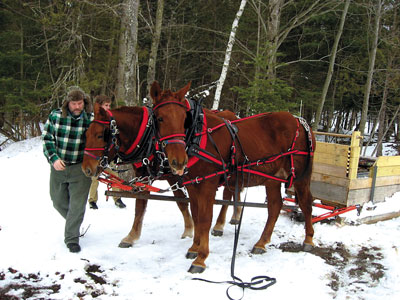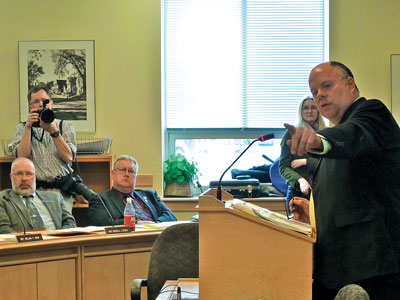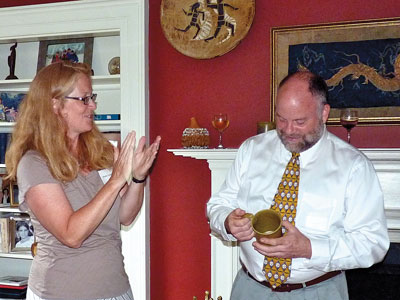 |
| Rep. Lance Harvell with his draft horses … Photo courtesy of Rep. Harvell. |
By Nancy Ross
“I think this is the beginning of a beautiful friendship.” – Casablanca
Draft horse colts romp in the paddock, a rotation crop of buckwheat flourishes next to the large organic garden, and the New England scything champion welcomes me into his energy-efficient house.
This isn’t the start of a MOFGA small farm profile.
It’s my meeting this past summer with someone on the other end of the political spectrum from most in the MOFGA community, someone who calls himself a “small government conservative,” and is called by others a Tea Party Republican. In the course of our lunchtime conversation, however, Lance Harvell, House of Representatives member from Farmington, gets harder and harder to categorize.
Within a few sentences, Harvell quotes political thinkers ranging from Thomas Paine, Jean-Jacques Rousseau and Wendell Berry to Adam Smith and Ludwig von Mises. He’s explaining how and why he became prime sponsor and prime mover behind LD 718, Maine’s bill to label genetically engineered (GE) food.
The bill, MOFGA’s policy priority for 2013, passed overwhelmingly in both houses of the Maine Legislature in June. Governor Paul LePage has committed to signing it in January 2014.
In summer 2012, Harvell contacted MOFGA. Russell Libby, then MOFGA’s executive director; Heather Spalding, associate director; and Katy Green, a key staffer to MOFGA’s public policy program, drove to Harvell’s home to hear his labeling proposal.
This was not Harvell’s first get-together with Maine organic farmers. In the early ‘70, when he was a preteen, he recalls, “These hippies were showing up at my father’s house. And I couldn’t understand because my dad wasn’t a hippie.
 |
| … and testifying before the Joint Standing Committee on Agriculture, Conservation and Forestry. English photo. |
“They were coming because they’d read The Good Life, and they were going to come live like that. They’d get up here and found out it wasn’t quite like what they’d read in Nearings’ book.
“But they’d figure, well, this Clayton Harvell’s got some work horses, so they’d come over and talk to him. A lot of those guys didn’t make it – and some of them did.
“But you saw – and I sense it a lot in some of the young again – when there are economic downturns, I think people redefine how they want to live.” Harvell paraphrases Wendell Berry. “What gives value to life? What doesn’t give value to life? You see a lot of young people who want to give farming a try.”
When he met with Libby, Spalding and Green in 2012, Harvell spoke of Maine farming and of labeling GE food. MOFGA had pursued labeling legislation, unsuccessfully, four times over the past 20 years.
But Harvell’s approach was a bit different. First, he came from a right-of-center perspective, with a focus on small business and marketplace economics. Second, he wanted Maine to be part of a multistate labeling compact instead of going it alone. And third, he believed, intensely, that he could actually get the legislation passed.
That summer, members of MOFGA’s Public Policy Committee discussed pros and cons of new labeling legislation. After Libby, Spalding and Green reported on their meeting with Harvell, some questioned whether a far right Republican would be the best sponsor and whether making labeling conditional on multistate approval was a good idea.
I was one committee member with questions. Should MOFGA’s key partner be a Republican when it looked as though the Democrats might retake the legislature? Shouldn’t multistate passage of the bill be a fallback strategy instead of a precondition?
 |
| Heather Spalding presents Rep. Harvell with a MOFGA mug during a celebration of the GMO labeling bill. English photo. |
I was wrong on both counts.
Harvell submitted his outline of the bill to legislative authorities that summer – before the election. In November 2012, he won re-election. At the same time, his party lost its majorities in both houses to the Democrats. Then, right after the election, Harvell got 123 Democrat and Republican legislators, out of 186 total members of the House and Senate, to sign as cosponsors of the bill.
Harvell’s multistate approach overcame an objection legislators had raised during previous attempts: that Maine’s share of the food market was too small to force labeling. “It wasn’t an unrealistic argument,” Harvell says. “There are some small companies that would say, ‘I’m not going to deal with it.’ I didn’t want that. So I knew that there would have to be some kind of compact with the states.”
From a ideological perspective, Harvell says, “the Republicans in a way were maybe a little more of a tougher sell because of the regulatory aspect of mandating labeling,” but he “knew that, with people that are social conservatives, there was always a problem that when you’re gene splicing, you’re playing God.”
For other cosponsors, he explains, “it was just me. I’m not trying to pat myself on the back. I mean that I knew them and they knew they weren’t going to get politically hurt with it.”
Beth Ahearn, political director of Maine Conservation Voters, worked closely with Harvell on the legislation. She saw both his party affiliation and his political acumen as essential. “This is a bill that has to come from the Republicans, because otherwise it can become partisan really quick. To get it to pass, you had to have a Republican sponsor.”
Ahearn says she has seen long lists of cosponsors on bills in the Maine Legislature before. “But, not on a bill so controversial. Not so big, not so bipartisan.” If it happened, it was “more of a passive thing with the Speaker [of the House] and Senate President putting it out in their offices for signatures.”
Says Harvell, “I just started talking to people about it and I was able to get a lot of Republicans and a lot of Democrats. I probably could have gotten a few more, but at some point I said, ‘I’m running out of time.’”
Harvell credits MOFGA’s grassroots organizing work, and the calls and emails from MOFGA members, for keeping sponsors loyal to the bill and for building support among legislators overall. “That was the essential role that MOFGA was playing. I got the sponsors. They helped lock them in.”
Ahearn echoes, “What was unusual from my perspective was how much support this bill had. It became a tidal wave. Legislators said they were hearing so strongly from constituents on two issues: guns and GMOs.”
MOFGA members and Lance Harvell were using the same argument to make the case for the labeling bill: Consumers have the right to know what’s in their food.
Harvell supports that right from a free market perspective. “As conservatives,” he says, “we believe in personal responsibility. Well, if you’re going to ask people to have personal responsibility, one of the rationales behind that is to give them information. How do people make the proper choices without access to information?
“We live in a world where people are busy and on the go, and because there’s so much that is GMO [genetically modified organisms], it’s much harder to find what isn’t. So, I always thought this is one of those issues that probably has to be mandated, because we’re so inundated with it.”
In support of labeling, Harvell gives another reason not usually associated with conservatives: opposition to the powerful agribusinesses that oppose labeling. Speaking “a bit critically” of “some of the modern pieces” of the Republican Party, Harvell says, “We don’t believe big government is better. Why do we believe big business operates any differently?
“At that point, they’re not operating on free market principles at all, so why should they be treated as such? The same bureaucratic entrenchment, and all that, exists in big business as much as in big government. It’s the nature of something that gets big and beyond an individual’s scope to control. Or beyond the people’s scope to control.”
Harvell is not a hypocrite. His regular job, outside of the Legislature – and in addition to his studies as a nontraditional student a few courses shy of a degree in political science and history at University of Maine Farmington – is as a mill worker at Verso Paper. Harvell cites examples from his work at the mill that “a conservative sees as overregulation.” He describes a day wasted, holding up needed repairs to carry out by-the-book lead paint abatement requirements “that take time and resources unnecessarily.”
At the same time, he tells me “you see a lot of corporations right now where it’s easier for them to hire lobbyists to affect legislation than it is to go out and compete in the marketplace.” Unlike individuals, “big businesses hire human resource people and lobbyists” to “take care of” legislation, he says.
Monsanto, which dominates the market in GE seeds, is Harvell’s prime corporate target. In a speech to the House of Representatives in support of LD 718, Harvell compared GMOs to the strawberries Goethe’s Faust enjoys in winter, and Monsanto to Mephistopheles who provides the berries in return for Faust’s soul.
Referring to Monsanto’s threats to sue Maine and other states that enact labeling laws, Harvell asked the House, “Are we going to give these people veto power over this body and the people of the State of Maine?”
Harvell faults Monsanto and the biotech industry for stealing intellectual property – genes from landrace seeds “humanity has bred for thousands of years” and from hybrid seeds developed by “land grant colleges that were owned by the people, that were paid for by the taxpayers’ dollars.” He also criticizes biotech companies and the FDA for allowing companies like Monsanto to do their own health and safety testing of their products.
He brings up environmental concerns: increase of monoculture, loss of biodiversity, superweeds resistant to herbicides, the threat of herbicides to soil health. But, he says, “I didn’t know that GMO labeling was going to be an environmental vote, to be honest with you.”
Harvell had not been a standard-bearer for environmental causes. Before 2013, his lifetime rating from Maine Conservation Voters was 19 percent, one of the lowest in the Legislature. Yet in 2013, he voted with MCV on five of the seven bills on the organization’s environmental scorecard.
He attributes some of his votes to consistency with his values and with sponsorship of LD 718, then adds,“ I’ve been working with Beth Ahearn a lot on this bill. Beth had a lot of influence on some of the other votes for me.” He smiles. “Beth told me I was going to get the most improved award.”
“Lance,” Ahearn says, “is a rare person in my experience. He is very bright. Very funny. Very passionate. I work on building relationships with all legislators. This year, he was my closest working relationship by far.
“I hope to continue that working relationship,” Ahearn says when I ask about the future. “There are things we can do. I think he had an image of me as a left-wing whacko. We have to counter perception with reality.”
Ahearn’s comment cuts both ways. Harvell’s work this year has countered environmentalists’ previous perceptions of him and others like him. The result, passage of LD 718, was a victory for the environment, for the right to know, for Lance Harvell, and, according to Harvell, “a victory for MOFGA.”
Says Heather Spalding of MOFGA, “We have a lot of respect in the Legislature now.”
Says Harvell, “Nothing wins in politics like being a player. Now MOFGA can be a player.”
What is MOFGA’s common ground for the future with players like Harvell?
At the national level, Harvell opposes crop subsidies. “If large farms are receiving subsidies that give totally unfair advantages in marketplaces, ending those subsidies is a wise thing to do.”
At the state level, he points to “bills that would improve small scale agriculture. Maine has to decide: Does it place value on its farms, and help them succeed?” He supports providing marketing tools and avoiding overregulation. A hunter and a promoter of locally raised livestock, he is also open to alerting the public to water pollution and use of nontherapeutic antibiotics at industrial confinement animal operations.
For a more specific policy agenda, Harvell says he has “to sit back and give it a lot of thought. Look at what other states do and what may or may not work here.”
Based on positive feedback from Spalding and others in the organization, MOFGA hopes to be looking along with him.
About the author: Nancy Ross was MOFGA’s executive director in the late ‘80s and early ‘90s. She went on to become a professor of environmental policy at Unity College – a job from which she recently retired. She continues to serve on MOFGA’s Public Policy Committee.
